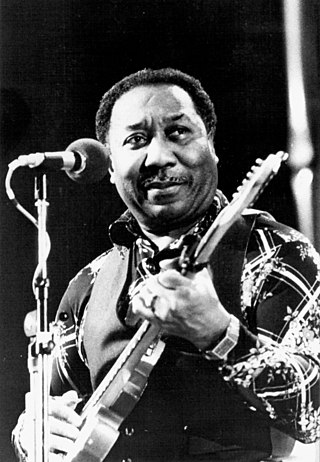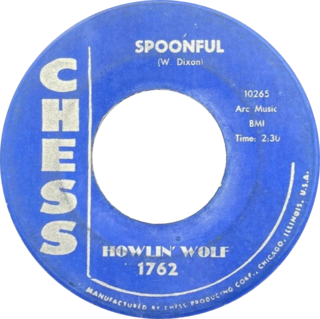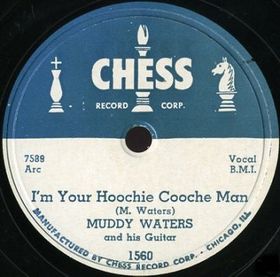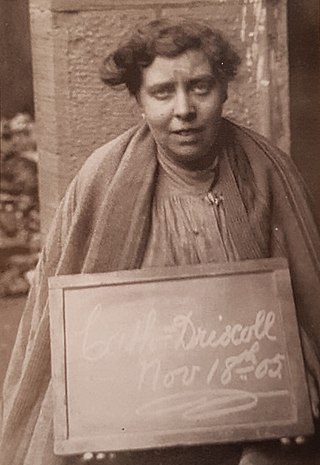
William James Dixon was an American blues musician, vocalist, songwriter, arranger and record producer. He was proficient in playing both the upright bass and the guitar, and sang with a distinctive voice, but he is perhaps best known as one of the most prolific songwriters of his time. Next to Muddy Waters, Dixon is recognized as the most influential person in shaping the post–World War II sound of the Chicago blues.

McKinley Morganfield, known professionally as Muddy Waters, was an American blues singer and musician who was an important figure in the post-World War II blues scene, and is often cited as the "father of modern Chicago blues". His style of playing has been described as "raining down Delta beatitude".

A pastor is the leader of a Christian congregation who also gives advice and counsel to people from the community or congregation. In Lutheranism, Catholicism, Eastern Orthodoxy, Oriental Orthodoxy and Anglicanism, pastors are always ordained. In Methodism, pastors may be either licensed or ordained.

Zhu Bajie, also named Zhu Wuneng, is one of the three helpers of Tang Sanzang, along with Sun Wukong and Sha Wujing, and a major character of the 16th century novel Journey to the West. Zhu means "swine" and Bajie means "eight precepts". Prior to his being recruited by the bodhisattva, Guanyin, Zhu Bajie went by "Zhu Gāngliè". Buddhist scholars consider that both expressions are related to "Śīla pāramitā". In many English versions of the story, Zhu Bajie is called "Monk Pig", "Pig", "Piggy", or "Pigsy".
"Bewitched, Bothered and Bewildered" is episode 16 of season two of Buffy the Vampire Slayer. It was written by Marti Noxon and first broadcast on The WB on February 10, 1998.

Robert John Daisley is an Australian musician and songwriter. A bass guitarist, he is perhaps best known for his intermittent relationship with vocalist Ozzy Osbourne, for whom he contributed bass, co-production and songwriting throughout the 1980s. Daisley has also worked with prominent rock acts including Black Sabbath, Rainbow, Gary Moore, Chicken Shack and Uriah Heep, among others. In 2013, he published his autobiography entitled For Facts Sake which has received outstanding reviews.

Mark Summers is the English CEO, sound engineer and music producer of Scorccio, a music production company founded in the UK in 1996. A London DJ since 1979, he is a guest lecturer and masterclass presenter on sample replay production, sound engineering, DJ culture, sampling and the music industry. His productions have been featured on hits for Nicki Minaj, Diplo, Sam Smith, the Prodigy, Pitbull, Fatboy Slim, David Penn, Jess Glynne, Disclosure, Steve Aoki, CamelPhat, Swedish House Mafia, the Shapeshifters and many other notable music artists. He is related to Herbie Flowers, one of the UK's best-known session bass players.

Shadrach Dingle is a fictional character from the British ITV soap opera Emmerdale. Shadrach Dingle was played by Andy Devine whose character debuted during 2674th episode of Emmerdale which aired on 30 March 2000. Since early 2010, the character appeared occasionally on an episodic basis after Devine felt he could not keep up with the busy schedule. The character, who had alcohol-induced liver disease, was killed off on 23 July 2010 after collapsing into a river and drowning whilst attempting to retrieve some beer cans. He was written out of the show due to the actor's retirement at age 68. Shadrach made an unannounced return in a flashback to Cain's childhood on 17 November 2017.

Otis Campbell is the fictional "town drunk" in Mayberry on the American TV sitcom The Andy Griffith Show. Otis was played by Hal Smith and made frequent appearances on the show from 1960 to 1967 but stopped appearing toward the end of the series because of concerns raised by the sponsors over the portrayal of excessive drinking.

"Spoonful" is a blues song written by Willie Dixon and first recorded in 1960 by Howlin' Wolf. Called "a stark and haunting work", it is one of Dixon's best known and most interpreted songs. Etta James and Harvey Fuqua had a pop and R&B record chart hit with their duet cover of "Spoonful" in 1961, and it was popularized in the late 1960s by the British rock group Cream.

John Henry Selman was sometimes identified as an outlaw and sometimes a working lawman of the Old West. He is best known as the man who fatally shot John Wesley Hardin in the Acme Saloon in El Paso, Texas, on August 19, 1895.

Whale Music is a novel by Canadian writer Paul Quarrington. It was first published by Doubleday Canada in 1989.

"Hoochie Coochie Man" is a blues standard written by Willie Dixon and first recorded by Muddy Waters in 1954. The song makes reference to hoodoo folk magic elements and makes novel use of a stop-time musical arrangement. It became one of Waters' most popular and identifiable songs and helped secure Dixon's role as Chess Records' chief songwriter.

Get Crazy is a 1983 American musical comedy film directed by Allan Arkush, and stars Malcolm McDowell, Allen Garfield, Daniel Stern, Gail Edwards, and Ed Begley Jr.

Charles Erskine was an Italian-Scottish papal diplomat and cardinal.

Harry Lewiston was an American showman, freak show director, and barker. He wrote his memoirs under his stage name, published posthumously in 1968 as Freak Show Man: the Autobiography of Harry Lewiston, as told to Jerry Holtman.

Law and Order is a 1953 American Western film directed by Nathan Juran and starring Ronald Reagan, Dorothy Malone and Preston Foster.

Vakkeel Vasudev is a 1993 Indian Malayalam film, directed by P. G. Vishwambharan, starring Jagadish, Jayaram and Sunitha in the lead roles.
Lock is a 2016 Indian Punjabi-language thriller film directed by Smeep Kang, written by Pali Bhupinder Singh and starring Gippy Grewal, Gurpreet Ghuggi, Geeta Basra, Karamjit Anmol and Smeep Kang as the main protagonists of the film and was released worldwide on 14 October 2016. The film is a remake of Malayalam film Shutter.

Catherine Lynch, née Catherine Driscoll, also known as Kate Driscoll, was a petty criminal from Swansea, Wales. Following the death of her father in an industrial accident in 1900, Driscoll took up employment as a domestic servant to a local publican's family. She rapidly descended into crime and alcoholism, and over the next few years was regularly convicted of prostitution, theft, and alcohol-related public order offences. She married in 1906, becoming Catherine Lynch, and although her criminal activity appears to have fallen somewhat following her marriage, she continued drinking heavily.


















